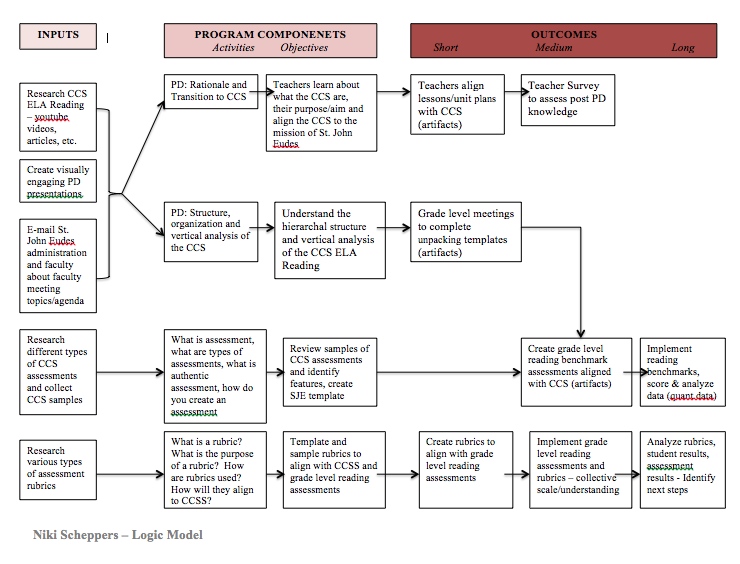Leadership Project Part 1: ELA CCSS Moderator
Introduction
The Leadership Project topic has been selected upon the request of administration and focuses on the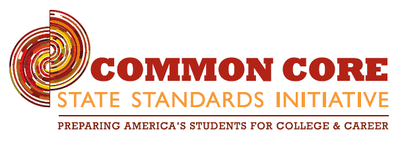 implementation of the Common Core State Standards (CCSS) specifically in English-Language Arts, Reading. The Leadership Project took place during the 2013-2014 school year with administration and teachers in grades kindergarten through eight at St. John Eudes School in Chatsworth, CA. The project was aimed at creating knowledgeable teachers who can effectively implement ELA CCCS in their instruction as a result of various on-site professional development opportunities. The final goal of the project was to work in grade level teams to create reading benchmark assessments that align with CCSS.
implementation of the Common Core State Standards (CCSS) specifically in English-Language Arts, Reading. The Leadership Project took place during the 2013-2014 school year with administration and teachers in grades kindergarten through eight at St. John Eudes School in Chatsworth, CA. The project was aimed at creating knowledgeable teachers who can effectively implement ELA CCCS in their instruction as a result of various on-site professional development opportunities. The final goal of the project was to work in grade level teams to create reading benchmark assessments that align with CCSS.
Purpose/Aim
The Common Core State Standards are being implemented at St. John Eudes as a result of a recent shift in policy. Along with 44 states across America California has chosen to implement the new Common Core State Standards (CCSS) in its schools. Based on California’s support of the CCSS, the Los Angeles Archdiocese is also supporting this shift in school policy. Since the Los Angeles Archdiocese has elected to shift to the use of the Common Core in their schools and curriculum it is mandating that the schools within the diocese make the same shift in policy. Although the L.A. Archdiocese is mandating that the schools within the diocese implement Common Core it is being flexible in how implementation at each school site takes place.
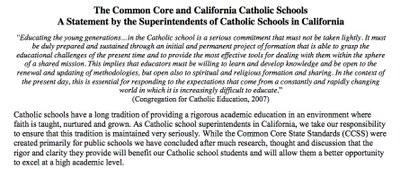
St. John Eudes in support of Common Core. California and the Los Angeles Archdiocese will implement Common Core Standards but not Common Core State Standards. The flexibility from the diocese allows St. John Eudes to concentrate on CCS as opposed to CCSS because many of the state standards are incomplete, not finalized in all subject areas, K-8, and are still a “work in progress”. As a result, the administration and faculty of St. John Eudes feel it is in the best interest of students and the curriculum to adopt the Common Core Standards now and plan for future implementation when Common Core State Standards in all subjects, K-8, are finalized. The K-8 teachers, along with administration, are working as the action site team of St. John Eudes School to develop curriculum, instruction and assessment aligned with Common Core Standards specifically ELA, Reading. Aside from adopting the standards the recent shift in policy also requires implementation of the CCS at the school wide level. In order to effectively implement the CCS awareness of the standards amongst staff must be created. Thus, various professional development opportunities are being provided to teachers K-8 concentrating on Common Core. The purpose of the leadership project is to provide K-8 teachers with information, in the form of professional development, behind the purpose and aim of CCSS to guide the effective implementation of the standards in the classroom as a result of the recent shift in policy.
By creating a mutual understanding of the Common Core Standards teachers will be able to effectively implement the CCS in their classrooms and work collaboratively to create reading benchmark assessments in grade level groups. These assessments will be created and implemented in grades K-8, will be aligned with CCS, the school’s mission, school wide learning expectations and the school’s curriculum. In creating a consistent understanding of Common Core St. John Eudes aims to ensure that all students receive a quality and equitable education that serves them not only in grades kindergarten through eight but prepares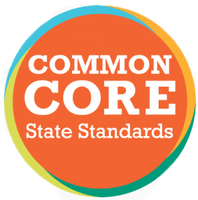 them for their future schooling and careers as well. In providing teachers with the knowledge to effectively implement the CCS the project aims to reduce marginalization at St. John Eudes in an effort to create a consistent reading curriculum for students and a consistent assessment routine for students both of which align with the school’s mission and the Common Core Standards.
them for their future schooling and careers as well. In providing teachers with the knowledge to effectively implement the CCS the project aims to reduce marginalization at St. John Eudes in an effort to create a consistent reading curriculum for students and a consistent assessment routine for students both of which align with the school’s mission and the Common Core Standards.
By implementing the standards across grade levels, K-8, the project intends to create consistency in classrooms, in curriculum and in school structure to enable all students to succeed academically and in accordance with the CCS. The CCS themselves aim to create consistency across the fifty states so that schools may provide children with the knowledge and foundational skills that enable them to succeed academically and beyond. The aim of Common Core is to create consistency in standards across the fifty states to avoid the marginalization of any group or groups of students. Common Core aims to ensure that all students receive an equitable and quality education. By providing teachers with the skills set and knowledge to effectively implement the standards the project aims to reduce marginalization at school in an effort to create a consistent curriculum for students that aligns with CCS. In developing curriculum, instruction and assessment aligned with CCS the faculty of St. John Eudes aims to ensure that students in grades K-8 are not only ready to move on to their chosen high school but are academically, socially and morally prepared to succeed in life after high school and college and in whatever vocation they choose.
For me personally the implementation of Common Core must align with the mission of St. John Eudes if itis to be effectively implemented and in the best interest of our students and school. While states are in
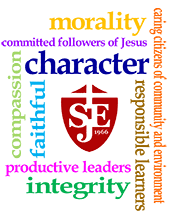
support of CCSS and schools and districts are moving to adopt Common Core it is of utmost importance the standards that they align with the mission of St. John Eudes.in implementing
"It is the mission of St. John Eudes School to educate students with Christian morality, character, compassion and integrity, to live as committed followers of Jesus Christ as faithful members of the Catholic Church and to succeed in the 21st century as responsible learners, productive leaders, and caring citizens of their communities and environment."
For the standards to truly be meaningful to our students, parents and staff they must reflect who we are as a school and a community. Thus, it is extremely important to relate the standards to our root beliefs as educators at St. John Eudes. The action site team, myself included, must use the mission as a “moral compass” to guide us through the process. There will always be mandates and requirements from above, in this case the Los Angeles Archdiocese. However, it is extremely important for any system, policy or program to be effective that it has meaning and holds true to its purpose, creating an equitable and quality education for children, and to who it serves, the K-8 students of St. John Eudes School. By keeping in mind our root beliefs and allowing our “moral compass” to guide us in the process, we are able to ensure that the CCSS are not only effectively implemented but that we are also able maintain our integrity as a school community in upholding our school’s mission.
Logic Model
Data and Analysis
The Leadership Project aims to effectively provide training on the Common Core Standards to teachers in grades kindergarten through eight, as well as content areas teachers at St. John Eudes School. As a result of training various items will be used to monitor the classroom and school wide implementation of the CCSS, assess the efficacy of training as well as guide future professional development. Three types of data, artifacts, observational data and inquiry data, are being collected to measure and monitor the implementation of the Leadership Project across the 2013-2014 school year.
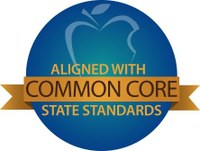 Artifacts are being collected from meetings, professional development and teachers to monitor the implementation of Common Core State Standards in the classrooms as a result of professional development training. Artifacts in the form of professional development presentations (Prezi and Powerpoint), teacher lesson plans, teacher unit plans and unpacking templates will be gathered by administration and should align with CCSS. These artifacts are beneficial in assessing professional development, the understanding of the CCSS and classroom implementation of the standards. Materials are collected from all teachers, grades kindergarten through eight as well as content area teachers, to measure the efficacy of the CCSS implemented not only at individual grade levels but also schoolwide.
Artifacts are being collected from meetings, professional development and teachers to monitor the implementation of Common Core State Standards in the classrooms as a result of professional development training. Artifacts in the form of professional development presentations (Prezi and Powerpoint), teacher lesson plans, teacher unit plans and unpacking templates will be gathered by administration and should align with CCSS. These artifacts are beneficial in assessing professional development, the understanding of the CCSS and classroom implementation of the standards. Materials are collected from all teachers, grades kindergarten through eight as well as content area teachers, to measure the efficacy of the CCSS implemented not only at individual grade levels but also schoolwide.
Inquiry data is being collected in the form of surveys to assess professional development training as well as the understanding of the Common Core Standards. Surveys are also administered to parents to gauge knowledge and understanding concerning CCSS and obtain feedback concerning the CCSS ELA Parent Workshops.
Various types of data will be collected throughout the year to measure and monitor the implementation of the Leadership Project and the efficacy of the project. It is important to use several types of data so the information obtained is not skewed and the results are objective and accurate. Through the use of artifacts, observational data and inquiry data various items will be collected, analyzed and assessed to determine the overall efficacy of the Leadership Project concerning the implementation of Common Core Standards at St. John Eudes School.
Changes for Future Implementation
Looking back on the evolution of my leadership project and my leadership role I am proud of the work that was accomplished as a team and personally. One of the major things in considering future implementation is time. With Common Core being such a large shift in policy there are several steps needed to effectively adopt, understand and implemented CCSS. That being said it is important to address each step and each cluster of standards with the same thought and dedication. While CCSS ELA was the focus during the 2013-2014 school year it will be interesting to see how the process unfolds and more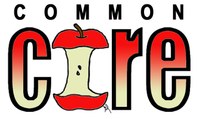 standards are adopted in years to come. Time needs to be allotted for teachers to work with, understand and implement the standards. In addition, time is necessary for teachers to implement the standards in their lesson and unit plans, assessments and academic vocabulary. Time is also required to allow teachers reflection on the process, their understanding and the roll out of the CCSS. Time was especially relevant for me during the 2013-2104 school year because I had to amend the proposed calendar of professional development.
standards are adopted in years to come. Time needs to be allotted for teachers to work with, understand and implement the standards. In addition, time is necessary for teachers to implement the standards in their lesson and unit plans, assessments and academic vocabulary. Time is also required to allow teachers reflection on the process, their understanding and the roll out of the CCSS. Time was especially relevant for me during the 2013-2104 school year because I had to amend the proposed calendar of professional development.
A rubric to score artifacts would be a beneficial tool to objectively score items, however currently St. John Eudes does not use or implement such a tool. As a result, a tool or rubric is being designed by the action site team to ensure objectivity and consistency in measuring artifacts and their alignment to the Common Core Standards. Artifacts are collected in various forms to ensure consistency amongst staff and grade levels and to ensure the application of Common Core Standards.
Final Thoughts on My Leadership Role
As a future leader I have used my role during the past year to reflect on the importance of adhering to a school's mission, philosophy and values, maintaing open communication and being transparent. Using the school's mission, philosophy and values as a moral compass enabled me to make all decisions in the best 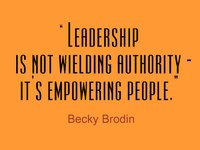 interest of the school and its stakeholders. The values of the school guided not only my decision making process but the decisions we made as a faculty when approaching and implementing Common Core.
interest of the school and its stakeholders. The values of the school guided not only my decision making process but the decisions we made as a faculty when approaching and implementing Common Core.
In the future I hope that St. John Eudes not only continues with implementation of ELA CCSS but begins to align ELA standards with writing and adopt math standards as well. As the new Common Core State Standards in science and history/social science are published it is imperative that St. John Eudes stays on-task, motivated and keeps up their commitment to implementing CCSS. Moving from ELA to speaking and listening as well as language standards serves as a good bridge to incorporate writing standards as well. From there the same, or a similar process, as the one done for the purpose of the leadership project should be conducted with CCSS Math to ensure consistency, rigor and be as up-to-date and well informed as possible for all stakeholders.
Supporting Documents
Post Self-Assessment of CPSELs
CPSEL CONNECTION
Standard 1: Facilitating the development, articulation, implementation, and stewardship of a vision of learning that is shared and supported by the school community.
- 1.1 Develop a shared vision
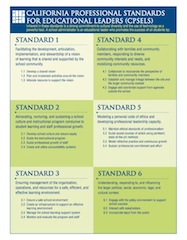
- 1.2 Plan and implement activities around the vision
- 1.3 Allocate resource to support the vision
Standard 2: Advocating, nurturing, and sustaining a school culture and instructional program conducive to student learning and staff professional growth.
- 2.1 Develop school culture and ensure equity
- 2.2 Guide the instructional program
- 2.3 Guide professional growth of staff
- 2.4 Create and utilize accountability systems
Standard 3: Ensuring management of the organization, operations, and resources for a safe, efficient, and effective learning environment.
- 3.1 Ensure a safe school environment
- 3.2 Create an infrastructure to support an effective learning environment
- 3.3 Manage the school learning-support system
- 3.4 Monitor and evaluate the program and staff
- 4.1 Collaborate to incorporate the perspective of families and community members
- 4.3 Engage and coordinate support from agencies outside the school
Standard 5: Modeling a personal code of ethics and developing professional leadership capacity.
- 5.1 Maintain ethical standards of professionalism
- 5.2 Guide sound courses of action using pertinent, state-of-the-art methods
- 5.3 Model reflective practice and continuous growth
- 5.4 Sustain professional commitment and effort
Standard 6: Understanding, responding to, and influencing the larger political, social, economic, legal, and cultural context.
- 6.1 Engage with the policy environment to support school success
- 6.2 Interact with stakeholders
- 6.3 Incorporate input from the public

